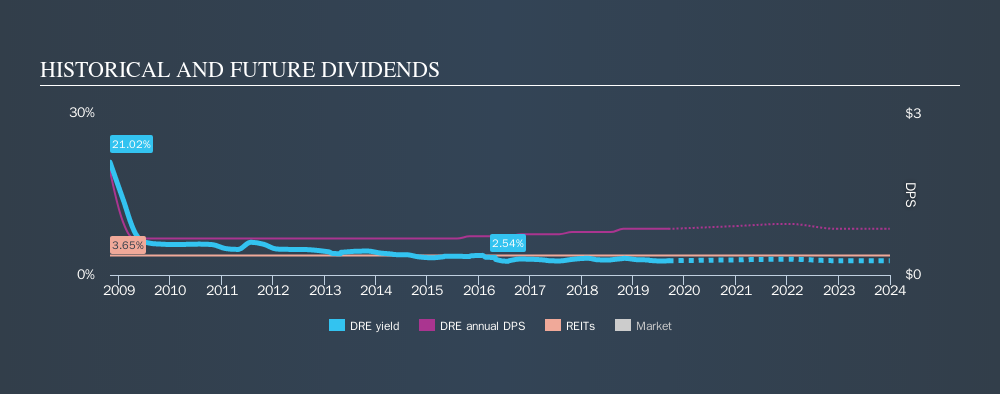- United States
- /
- REITS
- /
- NYSE:DRE
Could Duke Realty Corporation (NYSE:DRE) Have The Makings Of Another Dividend Aristocrat?

Could Duke Realty Corporation (NYSE:DRE) be an attractive dividend share to own for the long haul? Investors are often drawn to strong companies with the idea of reinvesting the dividends. If you are hoping to live on the income from dividends, it's important to be a lot more stringent with your investments than the average punter.
A slim 2.7% yield is hard to get excited about, but the long payment history is respectable. At the right price, or with strong growth opportunities, Duke Realty could have potential. There are a few simple ways to reduce the risks of buying Duke Realty for its dividend, and we'll go through these below.
Click the interactive chart for our full dividend analysis

Payout ratios
Dividends are typically paid from company earnings. If a company pays more in dividends than it earned, then the dividend might become unsustainable - hardly an ideal situation. Comparing dividend payments to a company's net profit after tax is a simple way of reality-checking whether a dividend is sustainable. Looking at the data, we can see that 60% of Duke Realty's profits were paid out as dividends in the last 12 months. A payout ratio above 50% generally implies a business is reaching maturity, although it is still possible to reinvest in the business or increase the dividend over time.
In addition to comparing dividends against profits, we should inspect whether the company generated enough cash to pay its dividend. The company paid out 59% of its free cash flow, which is not bad per se, but does start to limit the amount of cash Duke Realty has available to meet other needs. It's positive to see that Duke Realty's dividend is covered by both profits and cash flow, since this is generally a sign that the dividend is sustainable, and a lower payout ratio usually suggests a greater margin of safety before the dividend gets cut.
Duke Realty is a REIT, which is an investment structure that often has different payout rules compared to other companies. It is not uncommon for REITs to pay out 100% of their earnings each year.
Is Duke Realty's Balance Sheet Risky?
As Duke Realty has a meaningful amount of debt, we need to check its balance sheet to see if the company might have debt risks. A rough way to check this is with these two simple ratios: a) net debt divided by EBITDA (earnings before interest, tax, depreciation and amortisation), and b) net interest cover. Net debt to EBITDA measures total debt load relative to company earnings (lower = less debt), while net interest cover measures the ability to pay interest on the debt (higher = greater ability to pay interest costs). Duke Realty has net debt of 5.62 times its EBITDA, which implies meaningful risk if interest rates rise of earnings decline.
We calculated its interest cover by measuring its earnings before interest and tax (EBIT), and dividing this by the company's net interest expense. With EBIT of 3.28 times its interest expense, Duke Realty's interest cover is starting to look a bit thin. Low interest cover and high debt can create problems right when the investor least needs them, and we're reluctant to rely on the dividend of companies with these traits. That said, Duke Realty is in the real estate business, which is typically able to sustain much higher levels of debt, relative to other industries.
Dividend Volatility
One of the major risks of relying on dividend income, is the potential for a company to struggle financially and cut its dividend. Not only is your income cut, but the value of your investment declines as well - nasty. For the purpose of this article, we only scrutinise the last decade of Duke Realty's dividend payments. The dividend has been cut by more than 20% on at least one occasion historically. During the past ten-year period, the first annual payment was US$1.94 in 2009, compared to US$0.86 last year. The dividend has shrunk at around 7.8% a year during that period. Duke Realty's dividend has been cut sharply at least once, so it hasn't fallen by 7.8% every year, but this is a decent approximation of the long term change.
When a company's per-share dividend falls we question if this reflects poorly on either external business conditions, or the company's capital allocation decisions. Either way, we find it hard to get excited about a company with a declining dividend.
Dividend Growth Potential
Given that dividend payments have been shrinking like a glacier in a warming world, we need to check if there are some bright spots on the horizon. Strong earnings per share (EPS) growth might encourage our interest in the company despite fluctuating dividends, which is why it's great to see Duke Realty has grown its earnings per share at 73% per annum over the past five years. Earnings per share are sharply up, but we wonder if paying out more than half its earnings (leaving less for reinvestment) is an implicit signal that Duke Realty's growth will be slower in the future.
Conclusion
Dividend investors should always want to know if a) a company's dividends are affordable, b) if there is a track record of consistent payments, and c) if the dividend is capable of growing. First, we think Duke Realty is paying out an acceptable percentage of its cashflow and profit. Next, earnings growth has been good, but unfortunately the dividend has been cut at least once in the past. Ultimately, Duke Realty comes up short on our dividend analysis. It's not that we think it is a bad company - just that there are likely more appealing dividend prospects out there on this analysis.
Companies that are growing earnings tend to be the best dividend stocks over the long term. See what the 8 analysts we track are forecasting for Duke Realty for free with public analyst estimates for the company.
We have also put together a list of global stocks with a market capitalisation above $1bn and yielding more 3%.
We aim to bring you long-term focused research analysis driven by fundamental data. Note that our analysis may not factor in the latest price-sensitive company announcements or qualitative material.
If you spot an error that warrants correction, please contact the editor at editorial-team@simplywallst.com. This article by Simply Wall St is general in nature. It does not constitute a recommendation to buy or sell any stock, and does not take account of your objectives, or your financial situation. Simply Wall St has no position in the stocks mentioned. Thank you for reading.
About NYSE:DRE
Duke Realty
Duke Realty Corporation owns and operates approximately 159 million rentable square feet of industrial assets in 20 major logistics markets.
Very undervalued established dividend payer.
Similar Companies
Market Insights
Community Narratives


